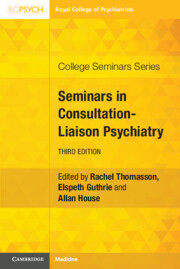Book contents
- Seminars in Consultation-Liaison Psychiatry
- College Seminars Series
- Seminars in Consultation-Liaison Psychiatry
- Copyright page
- Contents
- Contributors
- Chapter 1 The Assessment Process in Consultation-Liaison Psychiatry
- Chapter 2 Notes on Training Pathways in Consultation-Liaison Psychiatry
- Chapter 3 Nursing in Consultation-Liaison Settings
- Chapter 4 Psychological Reaction to Physical Illness
- Chapter 5 Self-Harm and Suicidal Thoughts
- Chapter 6 Depression in Medical Settings
- Chapter 7 Functional Somatic Symptoms
- Chapter 8 Alcohol Misuse
- Chapter 9 Substance Misuse
- Chapter 10 Psychosis in General Hospital Settings
- Chapter 11 Acute Behavioural Disturbance in the General Hospital
- Chapter 12 The Neurology–Psychiatry Interface
- Chapter 13 Perinatal Psychiatry
- Chapter 14 Paediatric Consultation-Liaison Psychiatry
- Chapter 15 Psychological Treatment
- Chapter 16 Legal and Ethical Issues in Consultation-Liaison Psychiatry
- Chapter 17 Social Aspects of Consultation-Liaison Psychiatry
- Chapter 18 Education for Acute Hospital Staff
- Chapter 19 Considerations in the Planning and Delivery of Consultation-Liaison Psychiatry Services
- Chapter 20 Outcome Measurement in Consultation-Liaison Psychiatry
- Chapter 21 The Evidence Base for Consultation-Liaison Psychiatry
- Chapter 22 Primary Care Consultation-Liaison Services
- Chapter 23 Emergency Department Psychiatry
- Chapter 24 Setting Standards for Consultation-Liaison Psychiatry Services
- Chapter 25 Policy to Practice
- Chapter 26 Consultation-Liaison Psychiatry
- Index
- References
Chapter 2 - Notes on Training Pathways in Consultation-Liaison Psychiatry
Published online by Cambridge University Press: 04 January 2024
- Seminars in Consultation-Liaison Psychiatry
- College Seminars Series
- Seminars in Consultation-Liaison Psychiatry
- Copyright page
- Contents
- Contributors
- Chapter 1 The Assessment Process in Consultation-Liaison Psychiatry
- Chapter 2 Notes on Training Pathways in Consultation-Liaison Psychiatry
- Chapter 3 Nursing in Consultation-Liaison Settings
- Chapter 4 Psychological Reaction to Physical Illness
- Chapter 5 Self-Harm and Suicidal Thoughts
- Chapter 6 Depression in Medical Settings
- Chapter 7 Functional Somatic Symptoms
- Chapter 8 Alcohol Misuse
- Chapter 9 Substance Misuse
- Chapter 10 Psychosis in General Hospital Settings
- Chapter 11 Acute Behavioural Disturbance in the General Hospital
- Chapter 12 The Neurology–Psychiatry Interface
- Chapter 13 Perinatal Psychiatry
- Chapter 14 Paediatric Consultation-Liaison Psychiatry
- Chapter 15 Psychological Treatment
- Chapter 16 Legal and Ethical Issues in Consultation-Liaison Psychiatry
- Chapter 17 Social Aspects of Consultation-Liaison Psychiatry
- Chapter 18 Education for Acute Hospital Staff
- Chapter 19 Considerations in the Planning and Delivery of Consultation-Liaison Psychiatry Services
- Chapter 20 Outcome Measurement in Consultation-Liaison Psychiatry
- Chapter 21 The Evidence Base for Consultation-Liaison Psychiatry
- Chapter 22 Primary Care Consultation-Liaison Services
- Chapter 23 Emergency Department Psychiatry
- Chapter 24 Setting Standards for Consultation-Liaison Psychiatry Services
- Chapter 25 Policy to Practice
- Chapter 26 Consultation-Liaison Psychiatry
- Index
- References
Summary
Consultation-liaison (CL) psychiatry was first recognised as a subspecialty of adult psychiatry in the UK in the 1980s (1). Training in psychiatry (as for all specialties) is overseen by the General Medical Council (GMC) and the curriculum in CL psychiatry is designed by the Royal College of Psychiatrists (RCPsych). It is subject to regular review and update. It provides a framework and identifies competencies which need to be achieved in order to attain credentials to practise independently. In this chapter we will explore the UK curriculum in detail and consider ways in which trainees could evidence how they achieve their competencies through their Personal Development Plan (PDP) and RCPsych portfolio. We will also briefly discuss training in CL psychiatry in a number of other countries around the world (see also Chapter 26 in this volume). All psychiatry training curricula in the UK have recently been revised (August 2022).
- Type
- Chapter
- Information
- Seminars in Consultation-Liaison Psychiatry , pp. 19 - 31Publisher: Cambridge University PressPrint publication year: 2024



